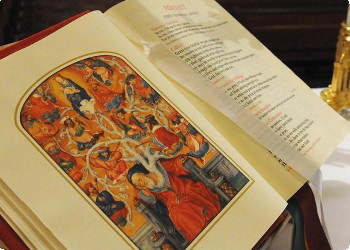Whoever obeys and teaches these commandments will be called greatest in the kingdom of heaven
12 JUNE (Mt 5,17-19)
What value does the old law retain for the disciple of Jesus? It is something to be repealed, delete, discard, or does it retain all its validity? The answer comes from the holy distinction between moral and ritual law. The ritual law obliges no more. The issue was settled permanently in the Council of Jerusalem.
Some who had come down from Judea were instructing the brothers, “Unless you are circumcised according to the Mosaic practice, you cannot be saved.” Because there arose no little dissension and debate by Paul and Barnabas with them, it was decided that Paul, Barnabas, and some of the others should go up to Jerusalem to the apostles and presbyters about this question. They were sent on their journey by the church, and passed through Phoenicia and Samaria telling of the conversion of the Gentiles, and brought great joy to all the brothers. When they arrived in Jerusalem, they were welcomed by the church, as well as by the apostles and the presbyters, and they reported what God had done with them. But some from the party of the Pharisees who had become believers stood up and said, “It is necessary to circumcise them and direct them to observe the Mosaic law.” The apostles and the presbyters met together to see about this matter.
After much debate had taken place, Peter got up and said to them, “My brothers, you are well aware that from early days God made his choice among you that through my mouth the Gentiles would hear the word of the gospel and believe. And God, who knows the heart, bore witness by granting them the holy Spirit just as he did us. He made no distinction between us and them, for by faith he purified their hearts. Why, then, are you now putting God to the test by placing on the shoulders of the disciples a yoke that neither our ancestors nor we have been able to bear? On the contrary, we believe that we are saved through the grace of the Lord Jesus, in the same way as they.” The whole assembly fell silent, and they listened while Paul and Barnabas described the signs and wonders God had worked among the Gentiles through them. After they had fallen silent, James responded, “My brothers, listen to me. Symeon has described how God first concerned himself with acquiring from among the Gentiles a people for his name. The words of the prophets agree with this, as is written: ‘After this I shall return and rebuild the fallen hut of David; from its ruins I shall rebuild it and raise it up again, so that the rest of humanity may seek out the Lord, even all the Gentiles on whom my name is invoked. Thus says the Lord who accomplishes these things, known from of old.’ It is my judgment, therefore, that we ought to stop troubling the Gentiles who turn to God, but tell them by letter to avoid pollution from idols, unlawful marriage, the meat of strangled animals, and blood. For Moses, for generations now, has had those who proclaim him in every town, as he has been read in the synagogues every Sabbath.” (At 15,1-21).
The moral law instead and all its subsequent development with regard to the relationship that exists between God and man, between man and man, between man and the whole of creation not only does it keep its eternal validity, Jesus himself brings everything to completion. He donates the law its perfect, divine, eternal truth. There is no real relationship between men, never might there be outside of the solid, strong, indelible principle of sound morality. Where sound morality, which comes from the will of God and His eternal and divine truth, is undermined, the whole world falls into a chaos of death. Life is from the true morality and it is true morality that which comes from the Lord’s Word. Never might the word of man be a creator of true morality. Man is a sinner and he establishes laws of sin, evil and death; laws that are against God and his creatures.
“Do not think that I have come to abolish the law or the prophets. I have come not to abolish but to fulfill. Amen, I say to you, until heaven and earth pass away, not the smallest letter or the smallest part of a letter will pass from the law, until all things have taken place. Therefore, whoever breaks one of the least of these commandments and teaches others to do so will be called least in the kingdom of heaven. But whoever obeys and teaches these commandments will be called greatest in the kingdom of heaven.
This present in time and the eternal future are of true life, if the Christian observes even the smallest precepts of the moral law and teaches others to do the same. Never might there be truly future of true good for who transgresses and teaches how to transgress.
Virgin Mary, Mother of the Redemption, Angels and Saints make us true observers.





